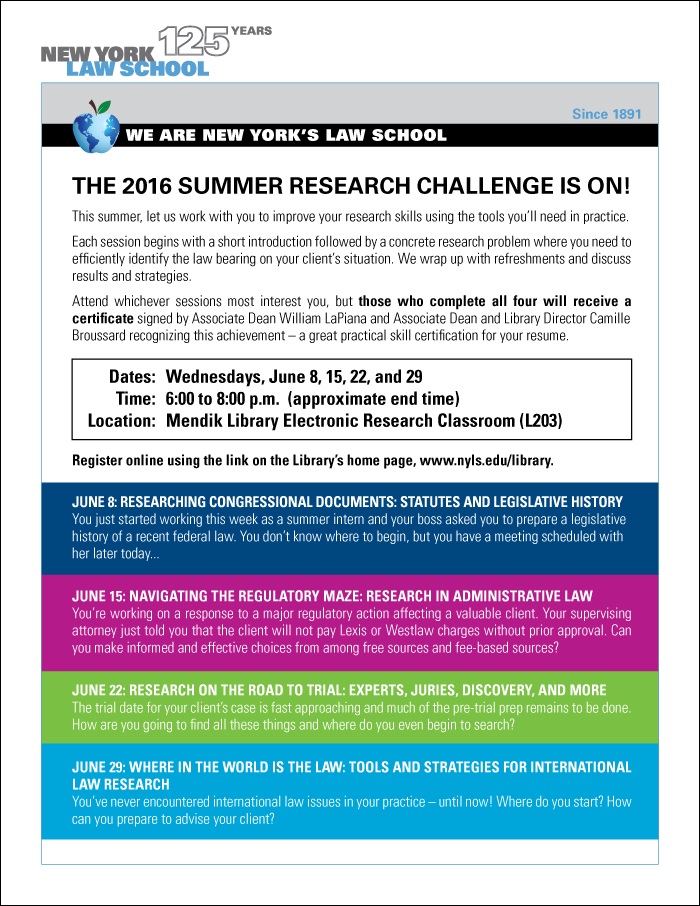The presidential election is just a few weeks away. The first debate between the major candidates is set for Monday, September 26, 2016. Are you looking for news and political information? The Library has many sources for your reading and research pleasure. Check out E-Journals A – Z under Research Tools on the Library’s home page to find links to many newspapers and magazines . . . including the New York Times, the Washington Post, and the multiple newspaper files available on Westlaw and Lexis.
Celebrate Constitution & Citizenship Day
September 17 marks the annual celebration of Constitution Day, commemorating the date on which 39 of the Philadelphia Convention’s delegates signed the Constitution in 1787. This year, it will be observed on September 16, and will include forty federal judges across the country swearing in new citizens during special naturalization ceremonies held at national historic landmarks. Chief Judge Robert A. Katzmann, of the U.S. Court of Appeals for the Second Circuit, will preside at an Ellis Island ceremony.
Constitution Day was created in 2004 to encourage public schools and governmental offices to promote a better understanding of the Constitution, the world’s longest surviving written charter of government.
The original document is held at the National Archives in Washington, D.C. You can read the Constitution online, or pick up your own pocket-copy at the library’s reference desk! For deeper coverage, you can also download the Library of Congress’s free app containing the official, annotated version of the United State Constitution, U.S. Constitution: Analysis and Interpretation.
For more information about the day, visit the National Constitution Center’s web site.
Attention 1Ls: Revised CALI Authorization Code
It turns out that the CALI authorization code that was distributed during First Week’s Finding the Law class in the Library was the code for SUNY Buffalo instead of NYLS. CALI inadvertently sent us the incorrect code.
If you have already registered with CALI, your registration has been reassigned to NYLS and you need not do anything further.
If you have not already registered with CALI, please disregard the authorization code that was stapled to the CALI brochure you received during First Week and stop by the Library’s Reference Desk to pick up a bookmark containing the revised authorization code.
If you are not currently a 1L student please disregard this post. The CALI authorization code remains the same as in previous years.
Law and the Olympics
 Not heading to Rio for the Olympics? Curious about the many different laws and regulations that underlie and sometimes impact what has been described as “the world’s most recognized international sporting event”? Check out the wide-ranging Olympics and International Sports Law Research Guide produced by the Georgetown Law Library. You may not win any medals but you’ll learn about the formal organization and legal structure of the Games and the various forums and procedures that govern resolution of disputes. So, in the spirit of the Olympics . . . Citius, Altius, Fortius!
Not heading to Rio for the Olympics? Curious about the many different laws and regulations that underlie and sometimes impact what has been described as “the world’s most recognized international sporting event”? Check out the wide-ranging Olympics and International Sports Law Research Guide produced by the Georgetown Law Library. You may not win any medals but you’ll learn about the formal organization and legal structure of the Games and the various forums and procedures that govern resolution of disputes. So, in the spirit of the Olympics . . . Citius, Altius, Fortius!
Listen to Second Circuit Court of Appeals Arguments
If you can’t make it to the U.S. Courthouse in Foley Square to attend oral arguments before the Second Circuit Court of Appeals, next month you’ll be able to access audio recordings of them from the court’s own website. See the court’s announcement here or here.
The recordings will become available on August 15, 2016, the first day of the court’s 2016 term.
Most of the other circuit courts of appeals also make audio recordings available on their respective web sites. The 10th and 11th circuits are the exception.
Podcast Wrapping Up Supreme Court’s Term
For a summary of the key Supreme Court cases decided this term check out this week’s Lawyer 2 Lawyer Podcast, hosted by Robert Ambrogi and featuring two Supreme Court experts. Click here for more details.
Bar Study Update
Extended Library study hours begin on Tuesday, July 5. On Sundays thru Thursdays, the Library will remain open until midnight. Starting on July 11, classroom space available outside the library for bar studying will be limited before 5:30 p.m. The Library understands that many of you like to study in small groups and occasionally converse. To that end, beginning on July 5, reasonable conversations will be allowed on L-4 for the remainder of the bar study period. If the group study room (L400), the compact shelving area, and two seminar rooms (L402 and L405) are available, please use those first for group study. The group study rooms on L-2 and L-3 are also available for your use. As our signs have always said – one person is not a group. But if a group study room is not available, you are welcome to engage in reasonable conversation at the table spaces on L-4. Floors L-2 and L-3 will remain quiet study spaces. We understand that July can be a stressful month in bar study land. Please remember to be kind to your colleagues: Control the decibel levels and help us keep your Library clean.
If you have questions, please let the reference librarians know. Good Luck and Stay Focused!
At Your Service this Summer
Need research help at your summer job or externship? Let us know—we’d love to help! Give us a call (212.431.2332), email (reference@nyls.edu) or text (917.300.1933) us, or drop by the reference desk until 8:00 pm weekdays (6:00 pm on Fridays), and noon-6:00 pm on weekends.
Law School 411
The study and practice of law has frequently been described as encompassing both the scholarly and popular aspects of cultural life. The Mendik Library’s Law School 411 LibGuide provides an online multimedia bibliography to students thinking about law school as well as to those currently enrolled. It features books, movies and websites dedicated to the all-pervasive discipline of law. Take a moment to explore the Guide’s many offerings, which run the gamut from inspiring stories about social justice, to ways in which students can maximize the many facets of the law school experience.


